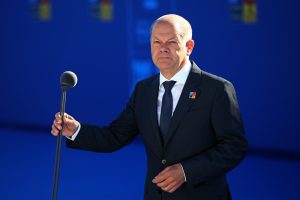When Germany’s present coalition government took shape in late 2021, its Coalition Agreement contained the makings of a new, much more critical approach to China. Until then, Germany’s China policy basically was about deepening and broadening the economic ties between the two countries; everything else, such as concerns about human rights violations and the repression of critical voices in China, or Beijing’s increasingly assertive posture in East Asia, was window-dressing. This now was to change.
The Agreement supported continued cooperation with China, but only “wherever possible” and only “on the basis of human rights and international law.” It stated that the Comprehensive Agreement on Investment (CAI) between the European Union and China, which the previous government under Chancellor Angela Merkel had managed to ram through the EU Council in the last days of 2020 against the warnings of the incoming U.S. Democratic administration of Joe Biden, presently could not be finalized “for a number of reasons” and demanded reciprocity of treatment for European companies in China’s domestic market. It talked about reducing Germany’s strategic dependence on China’s economy. It held that territorial conflicts involving China in the South China Sea and elsewhere in the region should be settled in accordance with international law, and that the status quo in the Taiwan Strait could be changed only by peaceful means and with the agreement of both parties. (There was more, but you get the message.)
In Germany, with its strong legalistic tradition, Coalition Agreements are all but sacred. They are long (in this case, 178 pages), and characterized by an often curious mixture of detail and vague generalities to paper over differences between the parties. Above all, however, they are central to all government work. They represent the blueprint for four years of politics, government decisions, and the passing of laws by the Bundestag, the German parliament. As the government started to get to work, the rhetoric from all three coalition parties suggested that Germany’s China policy was in for a major overhaul.
Then came the Russian attack on Ukraine. This painfully drove home the problems of Germany’s over-reliance on Russian fossil fuels: As Russia’s supplies of cheap natural gas, which for decades had underwritten Germany’s stellar industrial performance, dwindled and then were halted altogether, there was much-hand wringing and soul-searching over how Germany could have allowed such dependence to materialize. Concern over “weaponized interdependence,” “strategic vulnerabilities,” and the search for “supply-chain resilience” quickly focused not only on Russia, but also on China. This seemed to add further weight and momentum to efforts to re-design Berlin’s approach toward China. Reducing dependence on China became the new watchword not only in Berlin, but also across German industry.
As the depth of Germany’s economic dependence on China became fully apparent, however, this turned out to be easier said than done. The German car industry sells about 40 percent of its total production in China; for Volkswagen, the figure is around 50 percent, and without the Chinese market, itwould probably no longer be viable as an independent car producer. BASF, the world’s largest chemical company, recently opened a huge new production site in southern China on which it has spent 10 billion euros; it expects to generate two-thirds of its future revenue growth in the Chinese market.
Nor is it only the large German multinationals that depend on China. According to an analysis of a representative sample of German companies, 40 percent of trading companies and almost half of industrial firms depended on China for critical raw materials or intermediate goods. In the car industry, that share was 75 percent.
Reducing such high levels of dependence will take a lot of time. While corporate Germany here and there is undertaking steps to develop alternative sources of supply and markets, the overall direction seems to be to stick with China. Thus, a recent study by MERICS shows that the German car industry is deepening its presence in China, for example by expanding its stakes in local partners. It also is shifting R&D activities to China. The aim seems to be to “Sinicize” the German companies’ presence in China, at the cost of reducing ties and synergies with their German operations.
The realities of Germany’s economic dependence on China have produced a lot of pushback from industry against efforts to change Berlin’s traditional, business-friendly stance on China. It has also divided the coalition government, with the Greens and the Free Democrats pushing for a tougher approach to Beijing along the lines of the Coalition Agreement. In one recent test case, an attempt by the Chinese shipping company COSCO to acquire a 35 percent share of one of four terminals in the port of Hamburg, the Greens and the Free Democrats (and six ministries) opposed the deal to protect German critical infrastructure. Chancellor Olaf Scholz, however, favored the deal and eventually imposed a compromise on his reluctant coalition partners. Scholz had previously served as the mayor of Hamburg; in a conversation with Chinese Prime Minister Li Keqiang in this capacity, he called Hamburg “your home port in Europe.”
Scholz’s visit to China – the first by a major Western leader after the elevation of Xi by the 20th Party Congress – therefore represents a break with the Coalition Agreement and a return to a commercial foreign policy approach. The fact that he will be accompanied by the customary delegation of captains of German industry is the clearest sign of such as shift. Meanwhile, the Foreign Ministry, led by Annalena Baerbock of the Greens, is coordinating work by the government on a new German China strategy. At present, the document is expected in the spring of 2023 – at the earliest.













